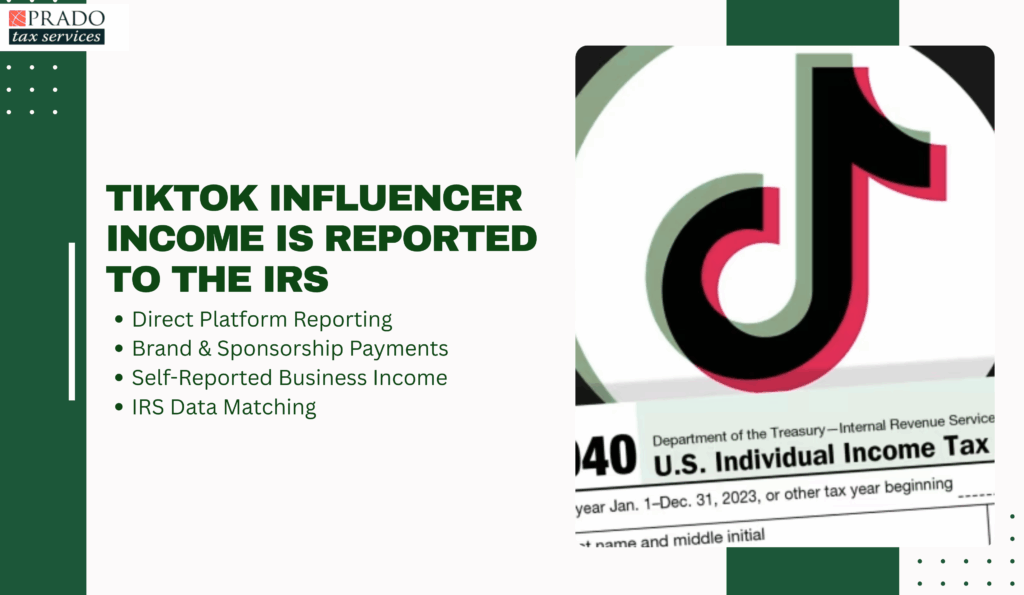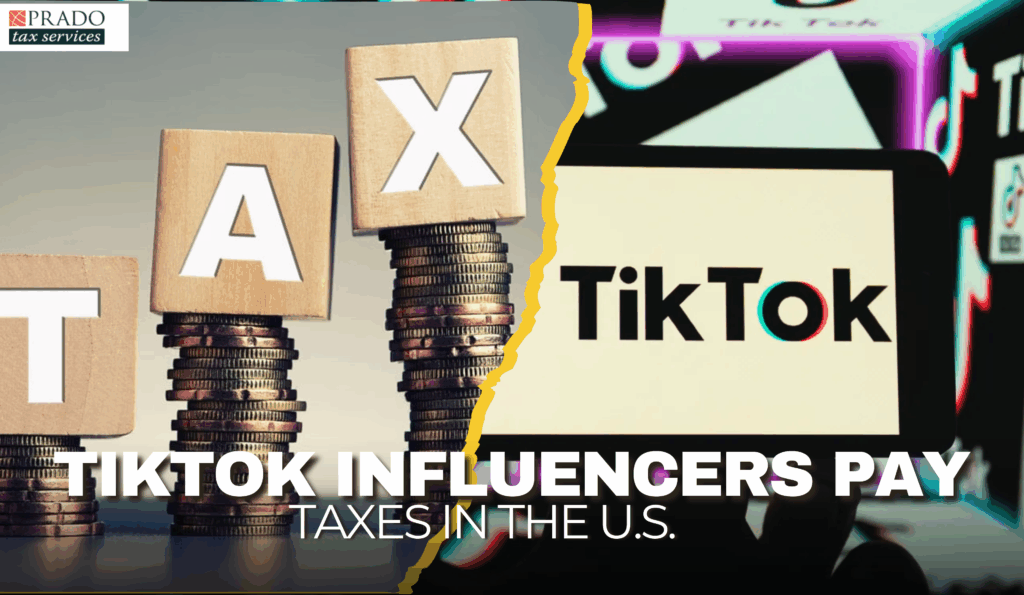Introduction
TikTok has transformed casual content creators into full-fledged micro-businesses. Some post a few videos; others earn serious money through the Creator Fund, brand partnerships, and affiliate marketing. If you’re earning online, a pressing question arises: Do TikTok influencers have to pay taxes in the U.S.? The short answer: yes, and understanding how starts with proper Tax Filing, smart Tax Planning, and the guidance of an experienced tax professional.
Whether you’re a hobbyist or aspiring full-time creator, every dollar counts. From payments through TikTok, Venmo, or PayPal to free products or services received, the IRS USA tax payment system expects informed compliance. Treating your content creation like a business from day one helps you manage income, minimize surprises, and keep the IRS happy. That’s the essence of proactive Tax Preparation, and it’s where a tax professional like those at Prado Tax Services can provide invaluable guidance.
In this article, you’ll learn what counts as taxable income, why the IRS treats TikTok creators as self-employed, when you must file, how to File Taxes for Content Creators and Influencers, and how to frame your influencer earnings for optimal Tax Filing. Think of this as your blueprint for foundational Tax Planning and seamless Tax Preparation as a content creator.
What Counts as Taxable Income?
When it comes to Tax Filing in the U.S., the IRS has a very broad definition of income. For TikTok influencers, “income” doesn’t just mean the cash that lands in your bank account. The IRS USA tax payment system requires you to report any form of compensation you receive for your work even if it isn’t money.
Types of Taxable Income for TikTok Creators:
- Cash Payments – Sponsorships, TikTok Creator Fund payouts, affiliate marketing earnings, and promotional deals are considered income that must be included in your Tax Filing.
- Products and Freebies – If a brand sends you free merchandise in exchange for creating content, the fair market value of those products is taxable. The IRS specifically states that bartered or in-kind exchanges are treated the same as cash.
- Services and Perks – Travel vouchers, event tickets, or other non-cash perks are also considered taxable income.
- Affiliate and Platform Payouts – Income through affiliate links or third-party payment platforms (like Venmo or PayPal) is reportable.
This broad definition means that if you’re receiving anything of value in exchange for content, you’re earning taxable income that requires Tax Preparation and thoughtful Tax Planning. Ignoring non-cash items is one of the most common mistakes new creators make.
Why This Matters
The IRS treats influencers as business owners, which means that every transaction counts. Whether you received $500 from TikTok’s Creator Fund or $1,000 worth of free clothing, both situations trigger tax obligations. Working with a tax professional can help you stay on top of what must be reported so your Tax Filing is complete and accurate.
Smart Tax Planning also ensures that you don’t get caught underreporting income, something the IRS can easily track through payment platforms and brand records. Early Tax Preparation gives you the peace of mind that your IRS USA tax payment aligns with the law.
Why TikTok Creators Are Considered Self-Employed
Most TikTok influencers are not “employees” of TikTok or the brands they work with. Instead, the IRS categorizes them as self-employed individuals. This classification matters because it changes how income is reported, how taxes are paid, and how you approach Tax Filing.
Self-Employment Defined by the IRS
The IRS states that if you earn income from running a business or trade as a sole proprietor, independent contractor, or freelancer, you are self-employed. IRS classifies them as self-employed individuals. For TikTok creators, your content is your business. Whether you’re making $500 from brand sponsorships or $50,000 from affiliate marketing, the earnings are considered self-employment income.
This classification means:
- You are responsible for the IRS USA tax payment of both income tax and self-employment tax.
- Unlike employees, no taxes are withheld automatically from your earnings.
- You must handle Tax Preparation on your own or with a tax professional to avoid mistakes.
Why This Impacts Tax Filing
Being self-employed means you’re on the hook for both the employer and employee portions of Social Security and Medicare taxes, often referred to as “self-employment tax.” This is currently 15.3% in addition to regular income tax. Without proactive Tax Planning, creators can end up with large tax bills they didn’t expect.
For many influencers, it’s crucial to budget throughout the year for IRS USA tax payment obligations. A qualified tax professional can guide you on making quarterly estimated payments, keeping clean records, and ensuring your Tax Filing is complete.
How TikTok Influencer Income Is Reported to the IRS
For TikTok creators, one of the biggest challenges is understanding how their earnings are recognized by the IRS. Unlike traditional employees who receive a W-2, influencers must handle income reporting through self-employment rules. Every payment received, whether from TikTok’s Creator Fund, sponsorship deals, affiliate links, or other digital platforms, is considered taxable income and must be included in your Tax Filing.

The IRS Perspective
The IRS tracks influencer earnings under the broader gig economy. Any income you earn, even if it comes through digital wallets or platforms, falls within the scope of IRS USA tax payment obligations. This means you are responsible for maintaining accurate records, reporting all amounts received, and paying applicable federal and state taxes. Relying on proper Tax Preparation and consistent Tax Planning can help you avoid discrepancies and keep your financial profile clean.
Why Accurate Reporting Matters
The IRS has increased its focus on online income, including TikTok influencers. If your reported income does not align with what platforms or brands submit to the IRS, it can cause issues during Tax Filing. IRS Direct File faces shutdown. Even if you do not receive official tax documents from every source, you are still legally obligated to report that income. Consulting with a tax professional ensures that your income is reported correctly and that your Tax Preparation aligns with current federal rules.
The Role of a Tax Professional for TikTok Creators
As TikTok creators grow their audiences, their income streams often expand rapidly from ad revenue and sponsorships to affiliate links and merchandise sales. This also means dealing with Self-Employment Tax. While exciting, this growth also makes taxes more complex. This is where working with a tax professional becomes invaluable.
Guidance Beyond Basic Tax Filing
A tax professional does more than simply handle Tax Filing once a year. They help creators build a long-term strategy through effective Tax Planning, ensuring every payment is accurately reported and every financial decision aligns with IRS rules. For influencers juggling multiple revenue sources, this guidance is essential for staying compliant with IRS USA tax payment obligations.
Why Professional Support Matters
- Accurate Reporting – With earnings spread across TikTok, brand deals, and digital platforms, mistakes in reporting can be costly.
- Proactive Tax Preparation – A professional ensures your income is categorized properly and helps you avoid unexpected tax burdens.
- Strategic Tax Planning – Beyond compliance, professionals can help forecast future obligations and set aside funds for smooth Tax Filing.
By partnering with experts like Prado Tax Services, TikTok creators get the benefit of both compliance and strategy. Choosing a California Tax Professional Service ensures localized expertise tailored to state and federal requirements. This balance between Tax Preparation and Tax Planning allows influencers to focus on content creation while ensuring their financial responsibilities are handled correctly.
Final Thoughts
The rise of TikTok has opened exciting opportunities for creators to turn creativity into real income. But with that income comes responsibility. The IRS clearly treats influencer earnings as taxable, meaning Tax Filing, consistent Tax Preparation, and forward-thinking Tax Planning are no longer optional; they’re essential. Whether you’re earning a few hundred dollars a month or building a full-time business as a creator, you’re part of the growing gig economy the IRS is watching closely.
Navigating IRS USA tax payment requirements doesn’t need to feel overwhelming. A trusted tax professional can make all the difference, helping you accurately report income, avoid errors, and create a strategy that keeps your finances organized year after year.
At Prado Tax Services, our team specializes in working with self-employed individuals, freelancers, and entrepreneurs, including digital creators. We provide tailored support in Tax Preparation, compliance, and Tax Planning, so you can focus on growing your brand while staying confident about your finances.
If you’re a TikTok creator unsure where to start, reach out today. The sooner you partner with a tax professional, the smoother your Tax Filing and IRS USA tax payment experience will be.

